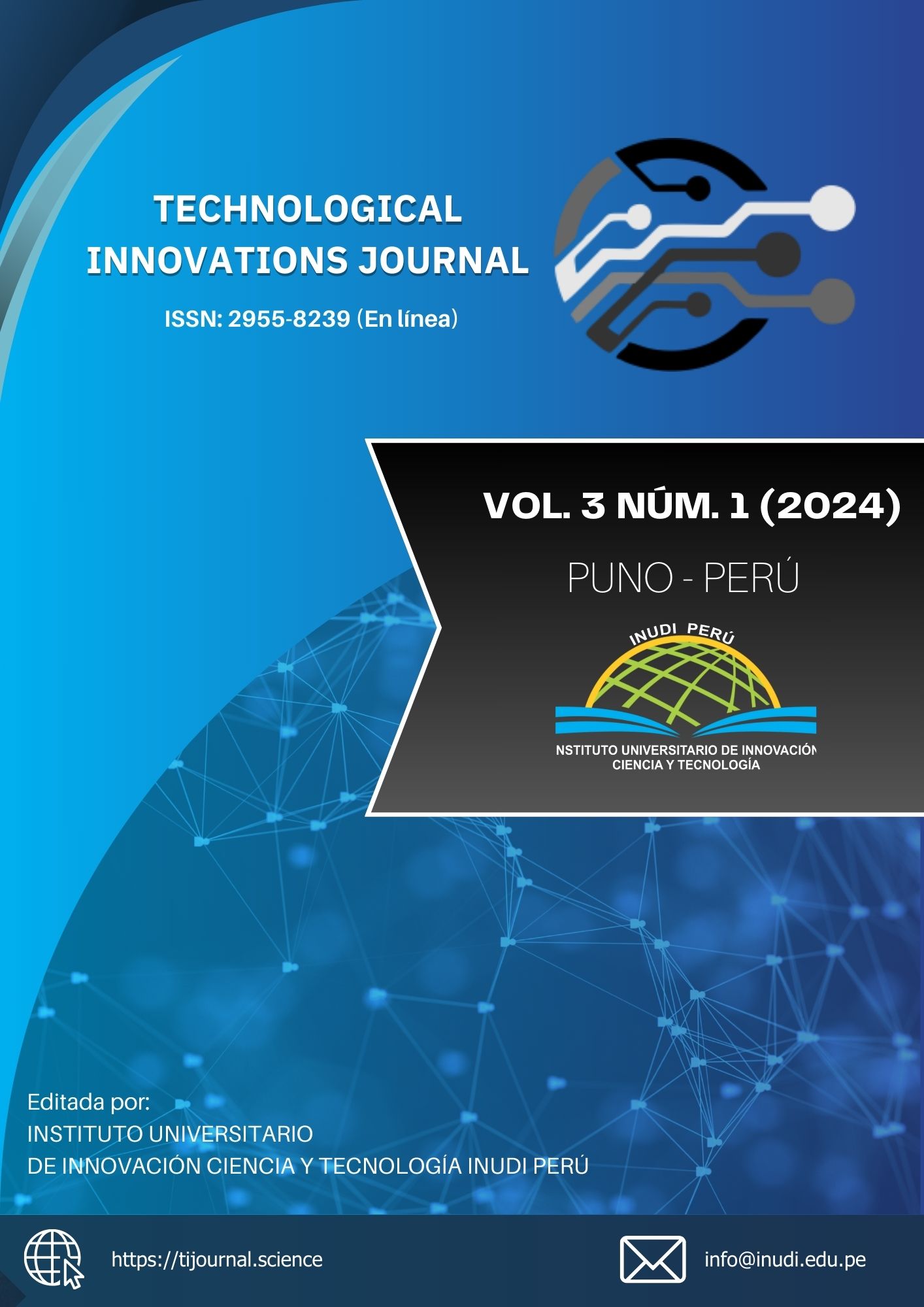Professors' perspective on competency-based curriculum design and educational quality in a Peruvian university
DOI:
https://doi.org/10.35622/j.ti.2024.01.003Keywords:
educational quality, competency-based curriculum design, university teaching, higher educationAbstract
This study aimed to investigate the relationship between competency-based curriculum design and educational quality from the perspective of teachers at a Peruvian university during the year 2022. The study population consisted of 207 teachers, both permanent and contracted, from which a sample of 66 teachers from various professional schools of the university was selected. The approach was quantitative, basic research with a descriptive design and a non-experimental transactional level. Two questionnaires were used as data collection instruments: one for competency-based curriculum design, consisting of 18 items distributed across three dimensions, and another for educational quality, with 15 items also divided into three dimensions. Both questionnaires demonstrated adequate psychometric properties. By analyzing the data using Pearson's correlation index (R), a direct and significant relationship was found between competency-based curriculum design and educational quality from the perspective of the teachers at the Peruvian university in 2022 (p = .000). There is continuous evaluation and adaptation of university curricula to align with the competencies required in the labor market and the educational expectations of teachers. The correlation found suggests that teachers perceive an improvement in educational quality when competency-based curriculum designs are adopted.
References
Abelha, M., Fernandes, S., Mesquita, D., Seabra, F., y Ferreira-Oliveira, A. T. (2020). Graduate Employability and Competence Development in Higher Education—A Systematic Literature Review Using PRISMA. Sustainability, 12(15), e5900. https://doi.org/10.3390/su12155900 DOI: https://doi.org/10.3390/su12155900
Aboubakr, R., y Bayoumy, H. M. (2022). Evaluating educational service quality among dentistry and nursing students with the SERVQUAL model: A cross-sectional study. Journal of Taibah University Medical Sciences, 17(4), 648-657. https://doi.org/10.1016/j.jtumed.2022.01.009 DOI: https://doi.org/10.1016/j.jtumed.2022.01.009
Acuña, M., y García, I. (2019). Co-diseño de prácticas educativas abiertas en una universidad a distancia. Revista Latinoamericana De Tecnología Educativa - RELATEC, 18(2), 1-9. https://doi.org/10.17398/1695-288X.18.2.151 DOI: https://doi.org/10.17398/1695-288X.18.2.151
Barahona, E., Paz, C., y Giner, A. (2022). Implementación del guion metodológico como experiencia curricular universitaria para el desarrollo de la competencia cooperativa. Revista Electrónica Educare, 26(3), 1-18. https://doi.org/10.15359/ree.26-3.10 DOI: https://doi.org/10.15359/ree.26-3.10
Castro, P. M., Ares, A., y Dapena, A. (2020). Service-Learning Projects in University Degrees Based on Sustainable Development Goals: Proposals and Results. Sustainability, 12(19), e7940. https://doi.org/10.3390/su12197940 DOI: https://doi.org/10.3390/su12197940
Díaz, H. (2018). Nuevas Tendencias y Desafíos de la Gestión Escolar. Ediciones SM.
Foadi, N., Koop, C., Mikuteit, M., Paulmann, V., Steffens, S., & Behrends, M. (2021). Defining Learning Outcomes as a Prerequisite of Implementing a Longitudinal and Transdisciplinary Curriculum with Regard to Digital Competencies at Hannover Medical School. Journal of Medical Education and Curricular Development, 8, e2110283. https://doi.org/10.1177/23821205211028347 DOI: https://doi.org/10.1177/23821205211028347
Travé Gonzalez, G., Travé Gonzalez, G. & Soto Rosales, A. (2022). Teachers' Notions about the Curricular Elements Presented in Textbooks and Teaching Materials. Remie Multidiciplinary Journal of Educational Research, 12(1)¸86-114. http://doi.org/10.4471/remie.8336 DOI: https://doi.org/10.17583/remie.8336
Hardianto, H. (2019). Conducting Quality Culture in Educational Institutions. Jurnal Ilmiah Peuradeun, 7(2), 25-27. https://doi.org/10.26811/peuradeun.v7i2.210 DOI: https://doi.org/10.26811/peuradeun.v7i2.210
Keshmiri, F. (2023). A developmental pathway toward leadership for educational change: the Educators’ experiences of the educational scholar program. BMC Medical Education, 23(1), 1-10. https://doi.org/10.1186/s12909-023-04015-8 DOI: https://doi.org/10.1186/s12909-023-04015-8
León, A. (2018). Aprendizajes que promueven los profesores en un enfoque curricular por competencia en educación superior. Revista Praxis Pedagógica 18, (23), 1-19. doi:10.26620/uniminuto.praxis.18.23.20. DOI: https://doi.org/10.26620/uniminuto.praxis.18.23.2019.1-21
Lestinen, S., Kilpeläinen, S., Kosonen, R., Valkonen, M., Jokisalo, J., & Pasanen, P. (2021). Effects of Night Ventilation on Indoor Air Quality in Educational Buildings—A Field Study. Applied Sciences, 11(9), e4056. https://doi.org/10.3390/app11094056 DOI: https://doi.org/10.3390/app11094056
López, F. (2022). El enfoque del currículo por competencias. Un análisis de la LOMLOE. Revista Española de Pedagogía, 80(281), 1-11. https://doi.org/10.22550/rep80-1-2022-05 DOI: https://doi.org/10.22550/REP80-1-2022-05
Lujan, G y Apolaya, J. (2021). Currículo por competencias en educación universitaria: retos y perspectivas de la educación virtual en el contexto de la Emergencia Sanitaria Nacional. SCIÉNDO, 24(1), 27-33. https://doi.org/10.17268/sciendo.2021.003 DOI: https://doi.org/10.17268/sciendo.2021.003
Martínez G., Curbelo, Cortés Cortés, M., & Pérez Fernández, A. (2016). Metodología para el análisis de correlación y concordancia en equipos de mediciones similares. Revista Universidad y Sociedad, 8 (4). http://scielo.sld.cu/scielo.php?script=sci_arttext&pid=S2218-36202016000400008
Mejía, D., y Mejía, E. (2021). Evaluación y calidad educativa: Avances, limitaciones y retos actuales. Revista Electrónica Educare, 25(3), 1-14. https://doi.org/10.15359/ree.25-3.38 DOI: https://doi.org/10.15359/ree.25-3.38
Mokel, M., y Canty, L. (2020). Educational outcomes of an online educational intervention teaching cultural competency to graduate nursing students. Nurse Education in Practice, 46, 102832. https://doi.org/10.1016/j.nepr.2020.102832 DOI: https://doi.org/10.1016/j.nepr.2020.102832
Montes de Oca (2016) Diseño Curriular basado en competencias: u desafio en la educacion superior Universidad Nacional Federico Villarreal Lim Peru, https://revistas.unfv.edu.pe/CVFP/article/download/1374/1453/5993
Ndomondo, E., Mbise, A., y Katabaro, J. (2022). History teachers’ conceptualization of competency-based curriculum in transforming instructional practices in lower secondary schools in Tanzania. Social Sciences & Humanities Open, 6(1), e100331. https://doi.org/10.1016/j.ssaho.2022.100331 DOI: https://doi.org/10.1016/j.ssaho.2022.100331
Nojavan, M., Heidari, A., y Mohammaditabar, D. (2021). A fuzzy service quality based approach for performance evaluation of educational units. Socio-Economic Planning Sciences, 7(3), e100816. https://doi.org/10.1016/j.seps.2020.100816 DOI: https://doi.org/10.1016/j.seps.2020.100816
Ponce, S., Kamandhari, H., Rodríguez, U., y Araujo Pantoja, P. (2022). A Matrix-Based Guideline to Chemical Engineering Curricular Revision. International Journal of Engineering Pedagogy (IJEP), 12(3), 110-140. https://doi.org/10.3991/ijep.v12i3.27323 DOI: https://doi.org/10.3991/ijep.v12i3.27323
Rosales, M. (2021). Diseño curricular por competencias y la calidad en la educación. Quito Ecuador: Universidad de las Fuerzas Armadas. Ciencia Latina Revista Muldisplinar Ciudad de México, México.. https://doi.org/10.37811/cl_rcm.v5i4.783. DOI: https://doi.org/10.37811/cl_rcm.v5i4.783
Shafi, M., Neyestani, M., Jafari, S., y Taghvaei, V. (2021). The Quality Improvement Indicators of the Curriculum at the Technical and Vocational Higher Education. International Journal of Instruction, 14(1), 65-84. https://doi.org/10.29333/iji.2021.1415a DOI: https://doi.org/10.29333/iji.2021.1415a
Singh, P., Alhassan, I., Binsaif, N., y Alhussain, T. (2023). Standard Measuring of E-Learning to Assess the Quality Level of E-Learning Outcomes: Saudi Electronic University Case Study. Sustainability, 15(1), 8-44. https://doi.org/10.3390/su15010844 DOI: https://doi.org/10.3390/su15010844
Solís, C., y Morón, H. (2020). How to Improve Sustainability Competences of Teacher Training? Inquiring the Prior Knowledge on Climate Change in Primary School Students. Sustainability, 12(16), e6486. https://doi.org/10.3390/su12166486 DOI: https://doi.org/10.3390/su12166486
Setyadi, D., Lestari, S., y Chasanatun, F. (2021). Educational quality assurance: social community services program for rural area. IOP Conference Series: Earth and Environmental Science, 747(1), 012089. https://doi.org/10.1088/1755-1315/747/1/012089 DOI: https://doi.org/10.1088/1755-1315/747/1/012089
Sukacké, V., Guerra, A., Ellinger, D., Carlos, V., Petronienė, S., Gaižiūnienė, L., Blanch, S., Marbà, A., y Brose, A. (2022). Towards Active Evidence-Based Learning in Engineering Education: A Systematic Literature Review of PBL, PjBL, and CBL. Sustainability, 14(21), 13955. https://doi.org/10.3390/su142113955 DOI: https://doi.org/10.3390/su142113955
Wong, E., Mendoza, M., Hernández, R., y Saavedra-Sánchez, H. (2022). Implementación de un modelo integrado de gestión académica con LMS en el sistema universitario. Publicaciones, 53(2), 217-254. https://doi.org/10.30827/publicaciones.v53i2.26826 DOI: https://doi.org/10.30827/publicaciones.v53i2.26826
Downloads
Published
Issue
Section
License
Copyright (c) 2024 Wilmer Coaquira-Coaquira (Autor/a)

This work is licensed under a Creative Commons Attribution 4.0 International License.











